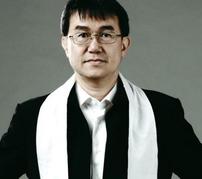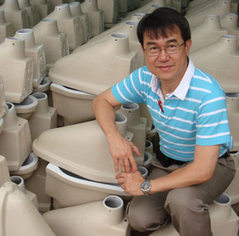
Region: Worldwide
Category: Sanitation, Health, Toilets
"You can’t fall down when you are sitting on the floor."
Jack Sim, Founder of the World Toilet Organization (WTO), has been a successful businessman since age 24, in a range of areas such as real estate development, international schooling and construction materials. Having achieved financial success in his 40s, Jack felt the need to change his direction in life and give back to humanity – he wanted to live his life according to the motto “Live a useful life”. Jack soon left his business and embarked on a journey that saw him being the voice for those who cannot speak out and fighting for the dignity, rights and health for the vulnerable and poor worldwide.
2.5 billion people in the world live without access to a toilet. As “talking toilets was taboo!” at that time, Jack decided to act and in 1998 founded the Restroom Association of Singapore (RAS) whose mission was to raise the standards of public toilets in Singapore and around the world. With time, he realized that there were other similar organizations around the world, which led him to found the WTO in 2001 and four years later the World Toilet College (WTC). Today, after 11 years of existence, the WTO has 258 member organizations in 58 countries.
His passion and persistence has made Jack the globally renowned “Mr Toilet”. In 2001 and in 2006, the Schwab Foundation has selected Jack as the Social Entrepreneur of the Year and in 2004 he was awarded with the Green Plan Award 2012 by Singapore’s National Environment Agency. Jack is an Ashoka Global Fellow and since 2008 carries the titles “Hero of the Environment” awarded by Time magazine as well as “Asian of The Year” awarded by Reader’s Digest magazine. Jack is also Schwab Fellow of the World Economic Forum. This year he was named Synergos Senior Fellow. He is now also an Adjunct Professor at Tel Aviv’s College of Management Academic Studies.
I grew up in poverty in the 1950s-60s when Singapore was poorer than Cambodia. I understand the psychology of the poor very well. I watched how my mother never went to school, became a self-taught Wedding Beautician and how she eventually transformed her business into a 1-Stop Wedding Planner Center. She served 3,000 couples in her career. At the age of 5, I already understood that doing business is such an easy thing.
I did badly in school: too talkative in class and was often ordered to stand outside. I never went to University, so after working as a Salesman for three years, I started a business since I had nothing to loose. I started importing roofing tiles from France to Singapore and started one new business every year until I had 16 profitable businesses at age 40. But when I realized that the average lifespan is only 80 years, I decided not to waste my time. Instead of making more money till I retired I wanted to do social work, which is a more meaningful use of my remaining time on Earth.
What was the biggest entrepreneurial success you had before starting RAS and the WTO?
At that time when I started RAS and WTO, people were embarrassed and unwilling to talk about toilets. But what you don’t discuss, we can’t improve. So I made it humorous. Restroom Association of Singapore was very well received by the public the instant it started. We managed to clean up most public toilets in Singapore.
Using the acronym WTO, the World Toilet Organization broke the global taboo on Toilets and Sanitation. When politicians realized the amount of media coverage on Toilets & Sanitation, they joined in. Both the media and politicians gave so much legitimacy to our work that academia, NGOs, social entrepreneurs, technologists, corporations, funders and everyone else started acting on the Sanitation Agenda.
Later, I began to make Sanitation attractive by making it a status symbol. We also trained the less fortunate to adapt to our SaniShop Micro-franchise producing latrines and selling them at low cost to their communities. The first three years, we sold 24,000 toilets in Cambodia and the program spread to Vietnam, India and is stretching out to Nigeria, Indonesia, South Africa and the Philippines.
Was there anyone particular who helped you develop into who you are today?
Many people came to help at different stages: donors, corporations, volunteers, etc. But it was Mr Condom’s one-hour chat, which led me to a good strategy. He taught me that if I can make people laugh, they would listen to me. It worked wonderfully! He is one of my role models.
Tell us more about RAS: How did you come up with the idea of launching a toilet organization in Singapore?
I was bored when the recession came. I could not create new businesses. Whenever I could not create, I suffocated. It was unbearable for me to do routine work. So I created social work. One morning, my Prime Minister said that we should measure our graciousness through the cleanliness of our public toilets; I thought this is a really interesting thing. I started ABC (Architecture Design, Behaviour and Cleaning) as a mantra for everyone to get clean and happy toilets. I even started a Happy Toilet Star Rating for the public toilets in Singapore. In 2005, I successfully persuaded the National Environment Agency to change the Building Code of Practice such that ladies’ toilet can have more cubicles to compensate for the urinals in the gents, avoiding queues by ladies’ toilets. The same law is now available in Hong Kong, China, USA’s federal Buildings and in Australia.
What were the first days / weeks / months like? What were the biggest challenges you had to face during the early years of RAS and later WTO? How did you overcome these challenges?
It was fun all the way. You can’t fall down when you are sitting on the floor. I felt since it was neglected for so long, I could not make toilets worse; hence I could only make it better. I worked for free and alone for the first seven years, so there was no financial pressure. It was a One-Man-Show advocacy campaign but the media presence of World Toilet Organization was as large as a big global NGO. I used the Leverage Model: Aligning multi-stakeholders’ interests towards a common Mission. Instead of organizing the World Toilet Summits every year, I gave out hosting rights and got paid for it. Each host made a very good event and they too were satisfied. We never spent more than we had but as we became more credible, donors and sponsors came to us and today we have 16 staff members and are more organized than before.
I see any delays in success for my ideas as “work-in-progress” and when I wait a little longer, I usually find someone to partner and make it happen. The nearest thing to a challenge was talking to my own government. Somehow, it is always easier to convince a foreign government but harder to do the same at home. Prophets tend not to be welcome at home. Some called it “The Carpenter’s Son Syndrome” with reference to Jesus’ problem in Nazareth.
Were there any particularly amazing or disappointing moments, which you encountered? What were they?
The amazing thing is how much the global media love to write about Toilets and Sanitation once it was turned it into humour. Before that, articles were so boring because academia and bureaucrats wrote them. Once we turned it into sound bites, it went viral. A Director from Publicis, the PR company for World Economic Forum, told me: “When I first read about World Toilet Organization at breakfast, my first thought was ‘these folks have got the wrong name. Who is going to believe an organization with a name like that?’ Then at tea break, when I was having my second cup of coffee, I had an epiphany: ‘WTO, these people has the best name for their organization!’” He said it took him three hours to figure it out because the name got stuck in his head and he could not get rid of it. It stuck. He was also amazed that the WTO brand had grown so large over the years. He thought it’d be a fad and go away. Instead, we reached one Billion audiences last year with our messages.
If you were to start up your organization again, what would you do different today?
I’d recruit a full board of active directors. In the past, so many board members only lend their names but were passive. If there is a good multi-talented team actively helping, we can do much more for our mission.
If you had to indicate the success of WTO, based on which facts would you justify it? Do you for example know how many people, because of WTO, no longer have to live without toilets?
We don't have many measurements. But we know the following:
- We’ve broken the Taboo and got everyone talking about toilets when they were unwilling to do so in 2001.
- World Toilet Day is the biggest annual sanitation event with international participants. We’ve reached one billion members in 2011. In 2010, we even beat Justin Bieber on Twitter on the 19th of November, World Toilet Day.
- World Toilet Summits series has been successfully executed for 12 years in a row and it is going strong. Each event created massive mind set changes in each region it took place.
- SaniShop franchise sold 24,000 toilets in 3 years and is now spreading to other locations. It has also generated many similar models and this is a very good thing for the Mission.
- President Clinton’s endorsement of WTO’s work has brought great status to the Sanitation Agenda.
- Our work is recognized by Time Magazine as Hero of the Environment and passed through the rigorous due diligence of the Schwab Foundation, Ashoka and Synergos to be accepted into their Fellowship.
When I first started, I asked where to register a world body and was told that it is not where to register; rather it is whether you are recognized by the world as a world body. I think we accomplished that.

We’ve to work collaboratively with everybody within the sector as well as across other sectors so that we can deliver sanitation in the most effective and efficient way. I see corporations as very good partners as they understand how to turn problems into business opportunities sustainably. Our partnership with Unilever is now very strong and in multiple countries. We’re now actively working with many other new ones. I believe that through market-based solutions, we can arrive at the day when everyone, everywhere can have access to proper sanitation anytime they need to use it. I imagine at least another 2 billions people can have that by 2020.
What are the main lessons you have learned since you became an entrepreneur?
That business is easier if you focus on where you want to go and not focus on what resources you have now. If you focus on limitations, not much will happen. If you focus on abundance, the whole world will conspire to help you achieve your mission.
If you are selfish, you will work alone and nothing will happen. If you are selfless, everyone will support you and success after success will happen for the mission. Not for you. It is not about you. It is about the mission.
"The entrepreneur needs to realize that a good entrepreneur may not often be a good manager. Therefore, it might be better for him to recruit a good manager to implement his vision rather than do it himself.
The entrepreneur is a visionary person who sees the end result but may not have enough clarity on the process, the manager is a structured and disciplined person that manages every steps: human resource, finance, logistics, daily command and control.
Management is about control and Entrepreneurship is about breaking rules.
That is why the entrepreneur and the manager are often two separate persons. Sometimes, the same person can have both qualities, but this is very rare. "
Entrepreneurship has evolved into a huge trend. What are, in your opinion, the biggest opportunities and threats related to this trend?
The biggest opportunities are by the base of the pyramid where four billion new customers await. By turning the four billion into a marketplace, we can train them with economic empowerment to help themselves make profits and create jobs, improve quality of life and sustain the growth to get them out of poverty and into dignity. The biggest threat is Capitalism on overdrive destroying the environment, polluting the waters, the air and the land. We’re on a suicidal path and excessive consumption cannot be the symbol of success anymore.
The new definition of a billionaire should be one who improves the lives of one billion people. Not one who merely has one billion dollars because that has no meaning in itself.
Besides the fact of having started a business (for profit or not), what distinguishes an entrepreneur from everyone else? What role does “unreasonableness” play in this?
An entrepreneur must focus on his dream. He does not have a complete plan but he knows he’ll get there. He treads between courage and foolhardiness. His ‘unreasonableness’ challenges the status quo and brings him to a new realm. Whether this new realm is better than the last depends on whether the entrepreneur is one with a conscience. If he doesn’t have a conscience, he can do much harm to society. He must temper his ego and not let it control him.
In your opinion, what will “The Next Big Thing” be?
The next big thing is the BOP. That’s why I started the BOP HUB: (www.bophub.org). We can end poverty by training people to become entrepreneurs, tradesmen, sales agents and with appropriate technologies. Singapore got out of poverty through building its own peoples capacity through economic empowerment. It did not succeed because of charity. BOP is the marketplace where economic and social objective converges. Many Multi-national corporations have understood this message and will be entering the BOP in a big way. The trend BOP set has now become clearer.
What do you see as the greatest challenges social entrepreneurs face in today’s world? What advice would you give them?
Decide on the un-served needs that you want to serve and be fearless. Fear is the main obstacle for people trying to create. Have the courage to believe you will succeed. Have the curiosity to learn what you need to do a good job. Have the humility to know that the mission is of first priority. Have the urgency to know that you don’t have much time because you are going to die when you are 80 years old. The days are numbered and you must hurry to make a difference. Live a useful and meaningful life. Die with peace in your heart knowing that you did not waste the time you have or squandered the opportunity to serve. That you have treasured every relationship you have had and given all the love you could give. Die happy.
If there were one change you would like to see in the world, what would it be?
That all religions converge into one and never have to be divided by their names, rituals, power or differences. We all eat, shit, live and die. We are part of nature and be humble that we are.
Is there anything else you would like to add?
Nothing


 RSS Feed
RSS Feed
